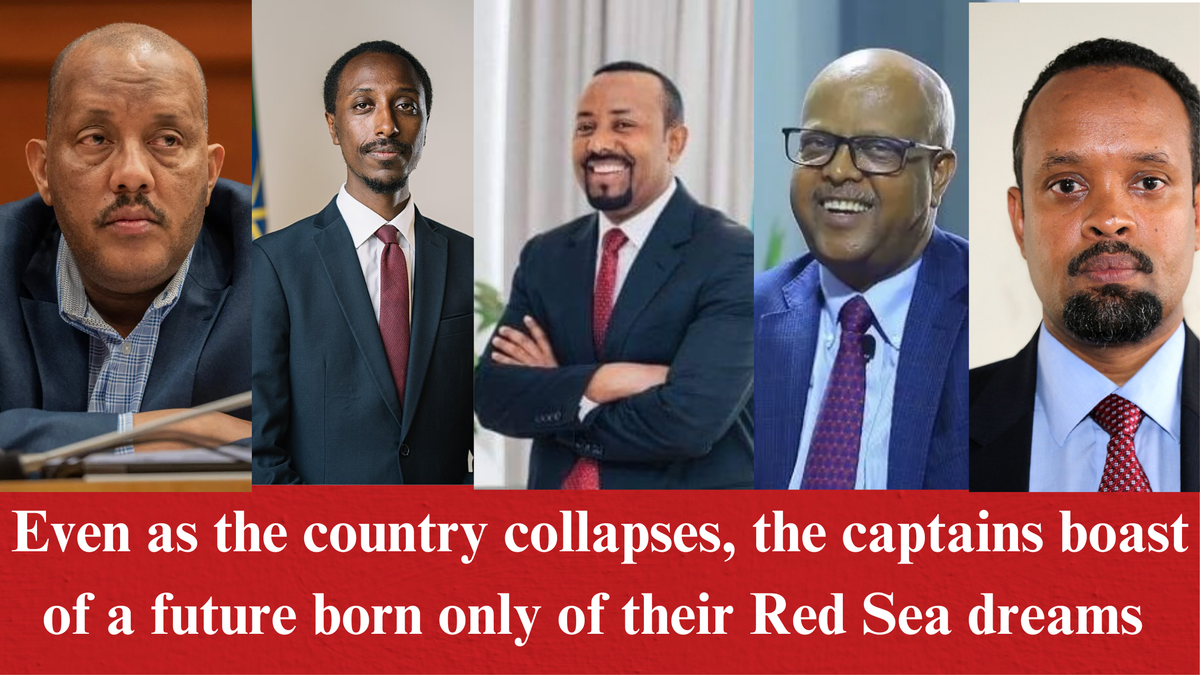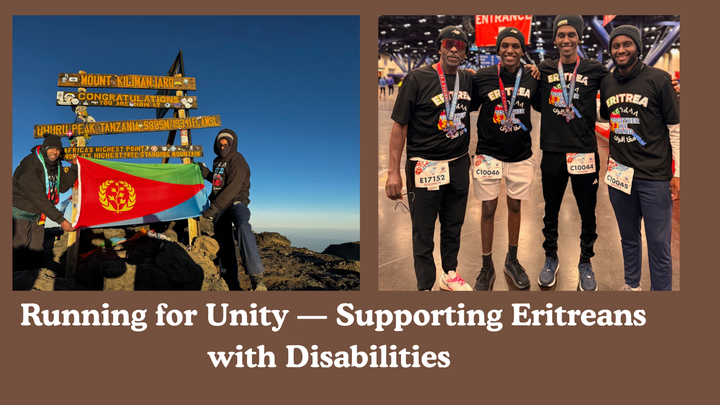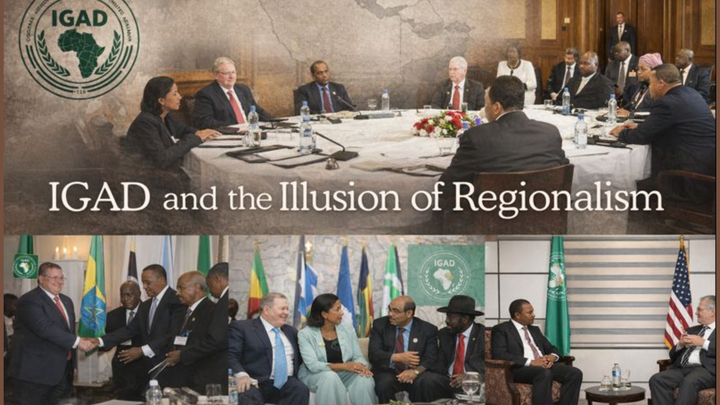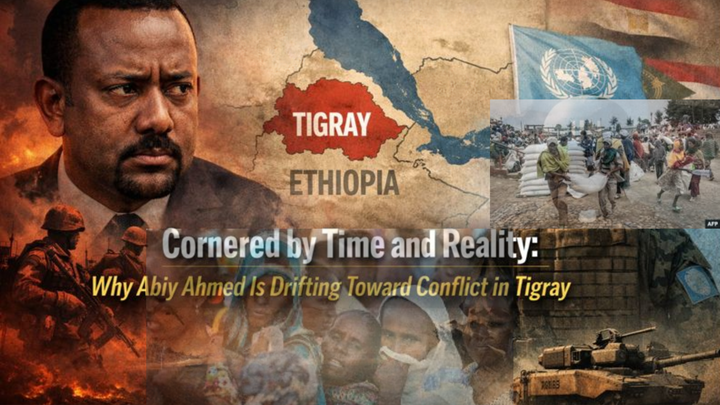Ethiopia’s Escalating Rhetoric Against Eritrea: A Direct Threat to International Peace and Security
Ethiopia’s escalating war rhetoric toward Eritrea and threats to seize Red Sea ports pose a grave danger to regional stability and global security. The UN Security Council must act before conflict erupts.

A Dangerous Turning Point: Why the UN Security Council Must Act Now to Prevent a Regional War
The Horn of Africa stands at a precarious moment. In November 2025, Ethiopian Prime Minister Abiy Ahmed used a nationally televised parliamentary address to issue what can only be understood as a direct declaration of war against Eritrea — a sovereign, internationally recognized UN member state.
He claimed that Eritrea’s 1991 independence was “not properly documented,” suggested it was given away “illegally,” and declared Ethiopia’s intention to “reverse” the outcome of that independence, including the “reclamation” of the Port of Assab by force if necessary.
Even more alarming was Abiy’s explicit demographic threat:
“We produce three million people a year.”
This statement implies that Ethiopia can absorb catastrophic casualties in a war with Eritrea — a rhetorical construction with genocidal implications. It suggests that Eritrea’s entire population could be replaced by Ethiopia’s demographic surplus within a year.
No state in modern history has made such a statement toward a neighboring nation, especially one with whom it shares deep cultural ties and a painful history of conflict.
This rhetoric, combined with state-orchestrated propaganda and Ethiopia’s attempts to internationalize its claims, poses a clear and escalating threat to regional stability, international peace, and the security of the Red Sea — one of the world’s most critical maritime corridors.
The UN Security Council must treat Ethiopia’s conduct as an emerging crisis requiring immediate attention.
Ethiopia’s Historical Revisionism: The Foundation of a Dangerous Aggression
Ethiopia’s escalating hostility toward Eritrea is rooted in a deliberate and calculated distortion of historical facts — a narrative crafted to justify territorial revisionism, destabilize the Red Sea region, and manufacture a pretext for confrontation. At the center of this distortion is Prime Minister Abiy Ahmed’s recent claim that Eritrea’s independence was never “properly handled” or “properly documented,” as though a sovereign nation that has existed for more than thirty years could be reduced to an administrative error. In reality, Eritrea’s independence is one of the most thoroughly documented and internationally validated processes in modern African history. The path to statehood passed through United Nations Resolution 390 of 1950, which established Eritrea’s federation with Ethiopia; Ethiopia’s unilateral and illegal dismantling of that federation in 1962; a thirty-year armed struggle for liberation; and finally the 1993 referendum, monitored and certified by the United Nations, in which the Eritrean people voted overwhelmingly — 99.8 percent — for independence. Eritrea’s sovereignty is not an unresolved question. It is a settled international fact recognized by the UN, the African Union, and governments across the world.
Equally dangerous is Ethiopia’s recent effort to misrepresent the status of the Port of Assab, claiming it was “illegally taken” from Ethiopia. This assertion ignores the foundational principles that governed post-colonial African borders, including the doctrine of uti possidetis juris, which preserved the integrity of pre-independence boundaries to prevent exactly the kind of revisionist claims Addis Ababa is now attempting to revive. It also disregards Ethiopia’s full acceptance of Eritrea’s borders at the moment of independence; the Algiers Agreement of 2000, which Ethiopia signed freely as a sovereign state; and the final and binding ruling of the Eritrea–Ethiopia Boundary Commission, which confirmed the border arrangements that Ethiopia now seeks to overturn through inflammatory rhetoric rather than legal channels. These facts demonstrate clearly that Ethiopia’s new narrative is not diplomacy — it is revanchism dressed in legalistic language, aimed at creating confusion, legitimizing aggression, and engineering a false historical foundation for potential military action.
By rewriting history and manufacturing false grievances, Ethiopia is creating an ideological platform that threatens to destabilize not only the Horn of Africa but the entire African continent, which has long treated colonial-era boundaries as inviolable precisely to avoid such conflicts. This is not a routine political dispute, nor an academic quarrel over historical records. It is a calculated state campaign to delegitimize the sovereignty of a neighboring UN member state and condition the Ethiopian public for confrontation. Such revisionism is extraordinarily dangerous in a region already strained by conflict, fragile states, and competing geopolitical interests. It places Eritrea at immediate risk, undermines the fragile security architecture of the Red Sea, and strikes at the heart of the international legal norms that underpin peace among African nations. The global community must see these distortions for what they truly are: an effort to erase settled history and justify expansionist ambitions under the guise of national necessity. Only by confronting and rejecting this narrative now can the world prevent a spiraling crisis whose impact would reach far beyond the Horn of Africa.
Genocidal-Coded Demographic Rhetoric
Prime Minister Abiy Ahmed’s declaration that Ethiopia “produces three million people a year” was not a rhetorical flourish or an abstract demographic reference. It was a carefully crafted political signal, delivered in the context of a speech questioning Eritrea’s sovereignty and invoking the possibility of force to “reverse” Eritrea’s independence. In a region where population size has long been manipulated as a psychological weapon, Abiy’s message was unmistakable: Ethiopia is prepared to sustain massive casualties in a conflict and can replace an entire nation’s population within a single year. Given that Eritrea’s population is approximately 3.7 million, the statement normalized the idea that Eritrea’s people are numerically insignificant and — by implication — expendable. This is not the language of statesmanship; it is the language of mass violence disguised as demographic arithmetic.
The deeper danger lies in the dehumanization embedded within the remark. When a head of government reduces an entire neighboring nation to a replaceable statistic, it strips those people of individuality, dignity, and humanity. Such framing has historically preceded some of the darkest episodes of mass atrocity in modern history, where numerical superiority was invoked as justification for aggression or ethnic cleansing. In Ethiopia’s current context — marked by internal conflict, political fragmentation, economic collapse, and pressure on the ruling party to unify a fractured public — this kind of rhetoric becomes even more volatile. A government unstable at home and desperate for nationalist cohesion abroad may view demographic dominance as a strategic asset rather than a moral warning. Abiy’s statement, therefore, revealed not only a willingness to contemplate large-scale conflict but a disturbing openness to framing such a conflict in terms that echo pre-genocidal logic. The international community cannot ignore this shift in tone; it signals an escalation in Ethiopia’s posture that carries profound implications for Eritrea, the Horn of Africa, and regional peace.
State-Led Propaganda: Preparing a Population for War
In the wake of Abiy Ahmed’s speech, Ethiopia witnessed an immediate surge in coordinated messaging across state broadcasters, party-aligned media outlets, diaspora networks, and Prosperity Party cadres. The narrative was unmistakably unified: Eritrea was portrayed as an enemy, an existential threat, a foreign agent obstructing Ethiopia’s future, and a destabilizing force that must be confronted. This was not a spontaneous outpouring of nationalism from the public; it was a centrally orchestrated communication strategy flowing through every official channel of influence.
The purpose of this campaign is clear. By saturating the public sphere with alarmist rhetoric and framing Eritrea as the root of Ethiopia’s challenges, the government is conditioning its population for confrontation and creating a psychological environment in which escalation becomes both acceptable and expected. In a nation already grappling with internal conflict, economic collapse, and political fragmentation, such manufactured hostility serves as a unifying distraction — one that transforms a neighboring sovereign state into a convenient scapegoat and lays the societal groundwork for potential war.
Ethiopia’s Internal Collapse: The Engine of External Aggression
Ethiopia’s belligerent posture toward Eritrea is inseparable from the profound internal crisis consuming the Ethiopian state. The country is unraveling on multiple fronts at once: a persistent insurgency in Oromia, widespread rebellion in the Amhara region, lingering instability and humanitarian trauma in Tigray, rising discontent in Afar, and an economy in freefall marked by soaring inflation, a collapsing currency, IMF dependency, and famine-like conditions in several provinces. Layered on top of this is the existential threat posed by Article 39, which grants every region a constitutional right to secede — a provision that now hovers over Ethiopia like a structural fault line, exposing the fragility of a federation struggling to hold itself together.
In such periods of national crisis, Ethiopian leaders have consistently turned outward, constructing external enemies to redirect public anger and consolidate power. Haile Selassie blamed Eritrean nationalists for undermining imperial unity; the Derg accused Somalia and portrayed Eritrea’s liberation struggle as an Arab conspiracy meant to destabilize Ethiopia; the EPRDF spent decades framing Eritrea as the source of its political and security challenges; and now Abiy Ahmed has resurrected the same pattern, casting Eritrea and vague “foreign actors” as the architects of Ethiopia’s current turmoil. This is not a new strategy but a well-worn reflex — the behavior of a state unable to manage its internal fragmentation and therefore reaching for a familiar scapegoat.
Compounding this crisis is Abiy’s political reality: under the present conditions, he cannot hold a legitimate national election. His government has effectively lost control of most of the country outside of Addis Ababa and a few urban pockets. Manufacturing an external conflict becomes a means to postpone accountability and suppress internal opposition under the banner of national emergency. Making matters worse, this escalation is fueled by external sponsors whose roles have been condemned by the United States, the United Nations, and other international actors. Their involvement reflects a broader strategy to fragment and destabilize the region — a strategy visible in Sudan and now mirrored in Ethiopia’s current trajectory. In this volatile environment, Eritrea is not the cause of Ethiopia’s crisis; it is the convenient target through which Ethiopia’s leadership seeks to mask its own collapse and rally a fractured nation around an invented external threat.
Ethiopia’s Failed Diplomacy and Egypt’s Ascendant Regional Supremacy
Ethiopia’s attempt to build an international coalition against Eritrea has collapsed completely, exposing the profound gap between Addis Ababa’s rhetoric and its actual diplomatic standing. For five years, Ethiopian officials worked tirelessly to depict Eritrea as a destabilizing force in the region, hoping to frame Asmara as the obstacle to peace and justify Ethiopia’s increasingly aggressive posture. These efforts failed at every level. At the United Nations Security Council, Ethiopia tried to persuade Russia—then the Council’s chair—to place the Red Sea issue on the agenda as a matter of international security implicating Eritrea. Russia rejected the move outright, stating clearly that the matter was bilateral and did not warrant Council intervention. Within the African Union, Ethiopia’s repeated attempts to isolate Eritrea similarly gained no traction; member states, wary of Ethiopia’s internal turmoil and inconsistencies, refused to join in the narrative. Globally, Ethiopia’s credibility has eroded as its internal conflicts, human rights abuses, economic collapse, and political fragmentation have become increasingly visible. Unable to rally external support, Ethiopia has turned inward, adopting more incendiary and extreme rhetoric to compensate for a diplomatic isolation of its own making.
The contrast with Egypt’s rising diplomatic stature could not be more striking, and the timing reveals a regional reality Ethiopia cannot escape. In the same period that Abiy Ahmed escalated his threats against Eritrea, Ethiopia staged a high-profile inauguration for the Grand Ethiopian Renaissance Dam (GERD) and an AU-aligned event intended to showcase Ethiopia’s influence. Addis Ababa expected a substantial international turnout. Instead, the event laid bare Ethiopia’s declining standing: only the leaders of Kenya, Somalia, and Djibouti attended, while no Gulf nation, major African power, or global leader deemed the ceremony significant enough to participate. This absence was not coincidental; it reflected widespread regional hesitation and mistrust of Ethiopia’s revisionist claims and increasingly aggressive tone.
Meanwhile, Egypt delivered a diplomatic masterclass. Cairo’s opening of its monumental new national museum drew an extraordinary gathering: eighty nations, more than fifty heads of state and foreign ministers, and delegations from across Africa, Europe, Asia, the Middle East, and Latin America. Eritrea was present, the GCC states were present, and major global actors attended without hesitation. Unlike Ethiopia, Egypt did not need to campaign for attendance; its stability, leadership, and central role in Red Sea and Middle Eastern affairs naturally brought the world to its doorstep. Beneath the cultural celebration lay serious strategic conversations—Red Sea security, maritime stability, navigation rights, the implications of Ethiopia’s threats, and the shifting balance of regional power. Egypt’s event became the epicenter of global networking and geopolitical dialogue, highlighting a level of diplomatic legitimacy and influence that Ethiopia simply cannot match.
Taken together, Ethiopia’s diplomatic failures and Egypt’s rising stature reveal a decisive regional shift. Ethiopia’s attempts to dominate the Red Sea narrative have not only failed—they have strengthened Egypt’s position and underscored Eritrea’s alignment with the recognized custodians of the region’s security architecture. Addis Ababa’s isolation is now unmistakable, and its turn toward inflammatory rhetoric reflects not strength, but desperation in the face of Egypt’s reassertion of regional leadership and the world’s clear rejection of Ethiopia’s revisionist agenda.

👉 Join today: https://www.eritreabusinessdirectory.com/
The GCC’s Rebuttal: A Direct Blow to Ethiopia’s Red Sea Ambitions
In the days following Egypt’s globally attended museum inauguration, the Gulf Cooperation Council issued a decisive and unprecedented statement that reshaped the regional conversation. The GCC declared plainly that only the littoral states of the Red Sea possess the authority to determine the political and security arrangements governing this strategic waterway. For Ethiopia, a landlocked country attempting to frame access to the Red Sea as an “existential” national issue, the declaration was nothing short of a diplomatic rebuke. It shut the door on Ethiopia’s efforts to insert itself into Red Sea governance and affirmed the rightful custodianship of Eritrea, Egypt, Sudan, and Saudi Arabia—states whose coastlines, security responsibilities, and historical roles anchor the region’s maritime order.
This statement carried implications far beyond its brief phrasing. It exposed the hollowness of Ethiopia’s campaign to internationalize its port demands and undercut Addis Ababa’s narrative that it has a legitimate stake in Red Sea decision-making. It also reinforced the unity of the actual Red Sea states at a moment when Ethiopia sought to destabilize that cohesion through inflammatory rhetoric and revisionist claims. For Egypt and its regional partners, the GCC declaration represented a strategic victory that solidified their leadership in Red Sea security and underscored their rejection of Ethiopia’s attempts to reframe the maritime status quo. For Ethiopia, it marked a clear diplomatic defeat, one that further isolated Addis Ababa and highlighted the widening gap between its ambitions and the geopolitical realities of the region.
Regional Realities and a Global Maritime Danger: Ethiopia’s Posture Threatens Red Sea Stability
The divide between Ethiopia’s shrinking diplomatic influence and Egypt’s growing regional authority is now impossible to ignore. Ethiopia stands increasingly isolated—mistrusted by its neighbors and viewed warily by global actors—as its aggressive rhetoric, economic collapse, and insistence on pushing a narrative rejected by the region erode its credibility. Egypt, by contrast, has emerged as a stabilizing and indispensable force in the region: an anchor of Red Sea diplomacy backed unequivocally by the Gulf Cooperation Council, coordinating closely with Eritrea on issues including Sudan’s crisis, and demonstrating reliable leadership in moments of global consequence. Egypt’s central role in the Gaza humanitarian arrangements underscored its diplomatic maturity and its recognition by major powers, including the United States, the European Union, and other global partners. Against this backdrop, Ethiopia increasingly resembles a state demanding attention rather than exercising influence—its behavior more akin to a destabilizing actor trying to insert itself into conversations from which it has largely been sidelined.
This contrast is even starker when placed against the strategic importance of the Red Sea. This waterway is not simply a regional passage; it is one of the world’s most critical maritime chokepoints. Approximately ten percent of global trade and twelve percent of global oil shipments rely on its stability. Any disruption would affect Asia, Europe, the Middle East, and the entire global shipping system. Countries such as the United States, China, India, Japan, South Korea, and major EU economies depend on uninterrupted Red Sea access for their commercial and energy security. Russia and Turkey also maintain strategic maritime and naval interests tied to Red Sea stability, and BRICS nations view the waterway as a vital corridor linking their emerging economies to global markets. In this context, Ethiopia’s repeated threats to seize Red Sea ports by force—under the guise of an “existential” national need—are not regional theatrics. They represent a direct threat to the global economic order and, by extension, to international peace and security.
If instability were to spill into the Red Sea, the consequences would be immediate and global. Supply chains would fracture, energy prices would surge, naval deployments could escalate, and tensions among global powers with competing maritime interests could intensify rapidly. Ethiopia’s current posture must therefore be understood as far more than a bilateral dispute with Eritrea. It is an emerging risk to one of the world’s most strategic maritime arteries. When a state already weakened by internal fragmentation, economic implosion, and diplomatic isolation threatens to alter the maritime status quo by force, the risks multiply dramatically. Ethiopia’s rhetoric has created a volatile environment with implications that extend from the Horn of Africa to Washington, Brussels, Beijing, Moscow, New Delhi, Ankara, Riyadh, and the capitals of the GCC.
The international community cannot dismiss Ethiopia’s behavior as domestic political messaging or routine posturing. The stakes now involve global commerce, energy security, geopolitical stability, and the foundational norms that govern international waterways. What Ethiopia threatens is not only Eritrea’s sovereignty—it is the stability of a maritime corridor on which the world depends.
Why the UN Security Council Must Act
Ethiopia’s conduct now fully meets the threshold for intervention under Article 39 of the United Nations Charter, which obligates the Security Council to determine when a state constitutes a threat to international peace, commits an act of aggression, or destabilizes global security. Ethiopia has openly questioned the sovereignty of a UN-recognized state, issued demographic threats with genocidal implications, and declared its readiness to use force to seize strategic Red Sea ports. Its actions directly endanger one of the world’s most vital maritime corridors and risk pulling multiple nations — including Egypt, Sudan, Saudi Arabia, the UAE, and Yemen — into a wider conflict. Ethiopia’s letters to the UNSC, crafted to portray Eritrea as a danger to global stability, are part of a longstanding pattern in which successive Ethiopian leaders have tried to weaponize international institutions to isolate Eritrea. But today, the global community sees the reality clearly: Ethiopia, not Eritrea, is the source of escalation and destabilization. The cost of inaction would be catastrophic, and the Security Council must now confront Ethiopia’s rhetoric and actions directly, not through vague calls for dialogue but through a firm determination under Article 39.
Conclusion: Preventing a Preventable War
Ethiopia’s escalating rhetoric is no longer a domestic political message or a bilateral dispute; it is a growing regional and global security threat. The attempt to erase Eritrea’s sovereignty, the use of demographic language with unmistakable genocidal undertones, and the repeated threats to disrupt Red Sea stability all point to a government seeking external confrontation to mask its internal collapse. The danger extends far beyond Eritrea and the Horn of Africa. A conflict in this region would destabilize the Red Sea, threaten global trade and energy flows, and risk drawing in multiple neighboring states. Meanwhile, Ethiopia’s isolation has been laid bare. Egypt’s rising diplomatic influence — affirmed by its global convening power and reinforced by the unified position of the Gulf Cooperation Council — has exposed the emptiness and illegitimacy of Addis Ababa’s narrative.
The international community cannot afford to wait until rhetoric becomes action. The Security Council must intervene decisively before Ethiopia’s threats ignite a regional war that could have global repercussions. Silence is no longer an option. Peace in the Horn of Africa, and the stability of the Red Sea on which much of the world relies, now depend on swift and principled action.
Contact: Aman@nefasit.com
NefasitPost relies on the strength of our community. If you value independent Eritrean reporting, timely analysis, and a platform that amplifies our voice, please subscribe and consider contributing. Your support helps us grow, stay independent, and continue telling the stories that matter.
👉 Subscribe or contribute today: https://www.nefasitpost.com/




Comments ()